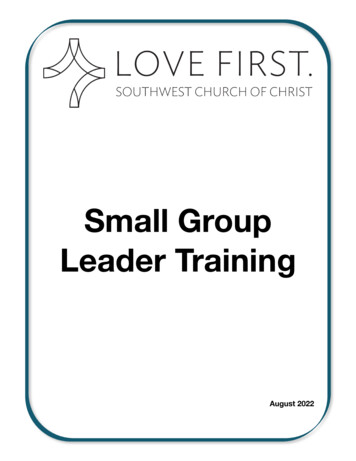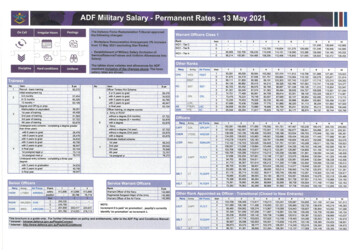
Transcription
Small Group LeadersTraining ManualSmall Group Leader Training, Bill Scheidler1
Small Group LeadersTraining ManualContentsPastoring Through Small Groups .3-5The Making of a Successful Cell Group Leader 6-9Ingredients of a Successful Cell Group .10-12Tips for Success as a Cell Group Leader 13-15Additional Guidelines for Cell Group Leaders .16Leading a Discussion .17-18Additional ResourcesHouse to House Ministry .19-28Small Group Leader Training, Bill Scheidler2
PASTORING THROUGH SMALL GROUPSBy Bill ScheidlerI.THE DESIRE OF THE CHIEF SHEPHERD (John 10:7-18)Jesus is the Great Shepherd of the sheep and has certain desires in relationship to the sheep. Asleaders, we must all share these desires.A. To care for all the needs of the flock (Ps. 23:1; Jer. 23:4)B. To raise up strong marriages and families (Mal. 4:6)C. To bring each person to a place of personal maturity (Eph. 4:13)D. To foster strong inter-personal relationships among the sheep (Eph. 4:16)E. To assist and equip each person in finding and fulfilling their place of ministry (Eph. 4:1112)F. To be available to each member of the body for counsel, support, encouragement, andcomfort (Ps. 23:3)G. To gather lost sheep and integrate them into the flock (Ezk. 43:12-16)II.THE PROBLEMA. The generation in which we are living is working against us (Acts 2:40; II Tim. 3:1-7).1.2.3.4.5.6.7.Self-centeredness and covetousnessDivorce and anti-family mentalityIrresponsibility and rebellionIsolation or lack of socializationEducational system and humanistic value systemSexual upheavalNeighborhood crime and general suspicionB. The church growth phenomenon compounds the problem. Five changes can occur in achurch that grows.1. The church can become program orientated rather than people orientated.2. The church can easily slip into pulpit pastoring rather than people pastoring.3. The church can become an assembly hall rather than an assembly line.4. The church can become an orphanage rather than a family.5. The church can become a ministry center rather than a ministry factory.C. As a church grows, different structures are needed to effectively minister to the people andassimilate new growth.Small Group Leader Training, Bill Scheidler3
III.THE SOLUTIONA. Moses’ solution to overseeing 3,000,000 people (Ex. 18:17-26; Deut 1:9-18)1. Concentrate in public on the preaching and teaching of the word, focusing on practicalprinciples of living.2. Divide the congregation into smaller segments.3. Place over these segments, individuals who are qualified and responsible.4. Work to train and equip these individuals to feed on their level.B. Jesus’ solution to feeding the 5,000 (Luke 9:14-15; John 6:10-11)1. Raise up and invest yourself into teachers.2. Spend enough time with them so that they share your heart.3. Give to them that which they need to focus on others.4. Divide the congregation into small groups.5. Have the trained disciples feed the small groups.IV.THE PURPOSE OF SMALL GROUPSA. Pastoral Care and DiscipleshipGod has definitely given His church the burden for pastoral care and discipleship. Our desireshould go beyond just birthing people into the Kingdom, but it should involve providingeffective covering and accountability that precipitates growth, and bringing people to a placeof personal fruitfulness and ministry. It is impossible to pastor a crowd in any individualway. The small group approach is a biblical way of feeding a multitude of people.B. Building Relationships and FellowshipIt is clear that God wants the individual members of the church to be more closely linked toone another so that they can be in a position to better minister to the needs of one another asthe Bible clearly directs. This was a top priority of the church in the Book of Acts and thesmall group helps to keep people from being alone in the midst of a large number of people.This is more important for the more passive, reserved and quiet personality, and yet all willbenefit greatly by their involvement.C. Assimilating New People into the ChurchWhether people are newly saved or simply new to the church, there needs to be a meanswhereby they can quickly feel a part if they are going to be permanently established andgenuinely committed to the vision of the local church. It takes several years to feel a part ofa crowd, but in a few, brief contacts in an intimate setting, people can feel loved, cared forand needed.Small Group Leader Training, Bill Scheidler4
D. EvangelismGod wants every believer to be reaching out to others in their sphere of influence. The smallgroup is a perfect place to introduce new people to other believers in the Body of Christ.Through the small group, it is possible for them to gain the support and the relationships thatthey need for them to be established.V.THE VEHICLE—THE SMALL GROUPA. The Small Group is an excellent context for Christian virtues and interpersonalrelationships to be developed and cultivated.1. It provides a context where someone new can be identified immediately with othermembers of the church.2. It provides a context where people can get acquainted with those who live close tothem.3. It provides a context where people can be made aware of needs in the body of Christ.4. It provides a context where people can get more intimately involved with each otherthrough practical expressions of love.5. It provides a context where the people of God can get a vision for the salvation oftheir own communities.B. There are many way in which the Small Groups can be structured to encourage people toget more involved in the lives of others.1. Focus on personal sharing.not preaching. All personal sharing must be guided butpeople need an avenue of expression.2. Have projects involving help within the cell group itself.3. Have fellowship times outside of the cell group.4. Take on an outreach project as a cell group.It must be remembered that the small group is not meant to compete with the other programs of thechurch. The small group is meant to supplement whatever else is going on and provide that which isnot available through any other arm of the church.Small Group Leader Training, Bill Scheidler5
THE MAKING OF A SUCCESSFULSMALL GROUP LEADERBy Bill ScheidlerThere is a certain aspect of leadership that is God-given and totally outside of one’[s control. Goddoes the calling and gifting that is necessary for someone to be involved in a certain ministry. Yet it isalso true that certain things can be cultivated by the called person that will render him or her more fitfor the task of God’s choosing. Any leader who desires to excel in Small Group ministry must giveattention to areas of development what will make him or her more successful.A successful Small Group leader is a:A.PRAYERFUL LEADERYou can measure your dependence on God by the amount of time you spend in prayer. Theleader should be consistent:B.1.In personal prayer (I Tim. 2:8).2.In the corporate prayer life of the church (Acts 2:42).3.In praying for those over him in the Lord (I Tim. 2:2).4.In praying for those for whom he is responsible (Phil. 1:4, 9; Col. 1:3, 9; Phm 4).5.In praying for specific needs that arise among your people (Jam. 5:13-16).DILIGENT LEADERThis refers to a leader who is constant and steady in applying him or herself to the task, ispersevering, persistent, industrious and not idle or negligent.He who has a slack hand becomes poor, but the hand of diligent makes rich. Proverbs 10:4The hand of the diligent will rule, but the lazy man will be put to forced labor. Proverbs 12:24The soul of a lazy man desires, and has nothing; but the soul of the diligent shall be maderich. Proverbs 13:4Be diligent to know the state of your flocks, and attend to your herds Proverbs 27:23Whatever your hand finds to do, do it with your might; for there is no work or device orknowledge or wisdom in the grave where you are going. Ecclesiastes 9:10C.CONFIDENTIAL LEADER (Ecclesiastes 3:7)A time to keep silence, and a time to speak 1. The word "confidential" literally means "with faith." When people come to you "withfaith" you must not let them down.a. Confident. When people come to you they want to feel confident that you will protectthem and their interests.Small Group Leader Training, Bill Scheidler6
b. Confidence. If people are going to have confidence in leaders, they must feel thatleaders can be trusted.2. The confidential leader is one who is not guilty of sins of the tongue.a. Talebearing (Lev. 19:16)You shall not go about as a talebearer among your people.b. Backbiting (Ps. 15:1, 3)LORD, who may abide in Your tabernacle? Who may dwell in Your holy hill?. Hewho does not backbite with his tongue, nor does evil to his neighbor, nor does he takeup a reproach against his friend.c. Gossip (Deut. 5:20)You shall not bear false witness against your neighbor.d. Whispering (Pro. 16:28)A perverse man sows strife, and a whisperer separates the best of friends.e. Slander (Psalm 101:5)Whoever secretly slanders his neighbor, Him I will destroy.3. The confidential leader practices the LAW OF LOVE—Always seeking the best interestof the other person.Hatred stirs up strife, but love covers all sins. Proverbs 10:12He who covers a transgression seeks love, but he who repeats a matter separates friends.Proverbs 17:94. The confidential leader practices the LAW OF FAITHFULNESS—Always remainingloyal to other members of the body of Christ.A talebearer reveals secrets, but he who is of a faithful spirit conceals a matter.Proverbs 11:135. The confidential leader practices the LAW OF EDIFICATION—Making sure that heonly speaks that which builds up and strengthens.Let no corrupt word proceed out of your mouth, but what is good for necessaryedification, that it may impart grace to the hearers. And do not grieve the Holy Spirit ofGod, by whom you were sealed for the day of redemption. Ephesians 4:29-30D. GRACIOUS LEADERThe following contrast is taken from Frank Damazio's book on The Making of a Leader.Small Group Leader Training, Bill Scheidler7
THE CONTRAST BETWEENTRUE AND DOMINEERING LEADERSHIPTRUE LEADERSHIPDOMINEERING LEADERSHIP1. Concentrates on influence from WITHIN1. Depends on external controls fromWITHOUT using tactics such as restrictions,rules, regulations.by encouraging, inspiring and motivating.2. Enjoys a good relationship with coworkers showing respect for theindividual.3. Works with co-workers toward achievinglong range goals with concerns for theworkers development.4. Aims to make himself unnecessary.5. Values the individual workers;encourages and praises rather thancondemns them.6. Desires power WITH co-workers,encouraging all input and feedback, andsharing the glory of the results.2. Relates to co-workers from an “I’msuperior/You’re inferior” standpoint.3. Demands immediate results, even if itdamages the potential in the co-worker.4. Creates an atmosphere where thesubordinate is permanently dependant uponhim5. Has a low opinion of workers, being verycritical of other’s mistakes.6. Desires power OVER co-workers assumingcredit for all accomplishments, and notdesiring any criticism.7. Is always willing to discuss actions andreasons for those actions (except whencircumstances will not allow it).8. Liberates the individual, encouragingideas and participation and equips himwith tools aiming at definite results.9. Is a “heart man”, portraying a genuineconcern for others.10. Is considerate of others.E.7. Interprets questions as personal criticism.8. Limits freedom of the individual, preferringto determine all actions and not truly to trainanyone else for the work.9. Is a “head man”, showing little or no humancompassion.10. Is concerned only with himself.FACILITATORAs a facilitator the Small Group leader is in the position as leader to:1. Make it easier for others to find meaningful relationships.2. Make it easier for all the needs of the group to be met.3. Make it easier for people to find their place in the body.Small Group Leader Training, Bill Scheidler8
4. Make it easier for people to identify with the Local Church.5. Make it easier for people to respond to what the Lord is saying to the church.In other words, the leader is in the position as a servant to the group to make their Christiangoals more easily attained. The leader is a “helper” of their joy (II Corinthians 1:24).Small Group Leader Training, Bill Scheidler9
INGREDIENTS OF A SUCCESSFUL SMALL GROUPBy Bill ScheidlerA.NATURAL HOME ATMOSPHEREThe nature of the Small Group ministry suggests the need for a warm, relaxedatmosphere, conducive to spiritual enrichment.1. SizeThe home should be large enough to accommodate the meeting or there is a tightatmosphere.2. AccessibilityThe home should be accessible to people and not difficult to find or approach, ifpossible.3. AppearanceThe home should be neat in appearance, orderly and, above all, clean.4. AtmosphereThe home, on the one hand, should not be chaotic, but, on the other hand, itshould not be so orderly that no one can relax.5. HostsThe Small Group should be hosted by people who have open hearts and an openhome who really want to use their home as a ministry.a. The hosts should be mature believers.b. The hosts should be friendly people, given to hospitality.c. The hosts should be those who enjoy the meeting themselves.d. The hosts should be people who have their children in order.e. The hosts should be people with a spiritual value system (i.e. people are moreimportant than things).f. The hosts should be disciplined people who have their home ready when it issuppose to be ready.B.PRAYERSmall Group Leader Training, Bill Scheidler10
Prayer should be a vital part of every meeting.1. The meeting should officially begin with prayer.2. Opportunity should be given during the meeting to pray for needs within thegroup.3. Special needs and concerns that involve the entire church may also be focused onfrom time to time.C.SHARINGThe sharing of lives is a main burden of the Small Group ministry.1. Sharing testimonies.2. Sharing praise reports.3. Sharing needs and concerns.4. Sharing in discussion.5. Sharing of lives both inside and outside of the meeting context.D.INVOLVEMENT OF THE PEOPLEOne of the goals of the Small Group ministry is to get people involved in the lives ofother people. This involvement will take two forms:1. Involvement in the meeting itself.a. Leading a songb. Opening in prayerc. Praying for needsd. Organizing an activitye. Telephone callingf. Sharing a testimonyg. Exhortationh. Bringing refreshments2. Involvement in each others’ lives outside of the meeting context.a. Special needsb. Work partiesSmall Group Leader Training, Bill Scheidler11
c. Visitor Follow-upd. Hospital visitatione. Wedding shower attendancef. Baby shower attendanceg. Funeral dinners and assistanceh. Other practical helpsi. Personal discipleshipE.FELLOWSHIP AND REFRESHMENTThis is not a secondary function of the meeting but one of the main reasons for themeeting. Quality time should be allowed for open fellowship. Every effort should bemade to see to it that quality refreshments are served.F.MAINTAINING AN EVANGELISTIC SPIRITIf the Small Groups are going to stay fresh and alive they must keep an outwardfocus. This involves assisting the leadership of the church to reach out to visitors,new converts, new attendees and new partners.Small Group Leader Training, Bill Scheidler12
TIPS FOR SUCCESS AS ASMALL GROUP LEADER1. Have confidence in God's choice (John 15:16).a. Of you as a leader (Eph. 2:10).b. Of the people he has placed in your care.2. Share the vision of the leadership.a. Make it your own.b. Speak it often to the people; let them sense your personal enthusiasm.3. Have a goal in everything.a. Don’t have activities simply for the sake of activities. Focus activities on areas consistentwith the purpose of the cell group. b.Building RelationshipsDeepening MaturityEquipping for ServiceCatching a Vision for their LifeGiving Opportunity for ServiceKnow what you want to accomplish in each meeting and/or activity.This means: Planning in advance Taking the meeting time seriously Making it a quality time Making the life group fun4. Always be positive and be bold.a. Christ is with you and He is mighty.b. Our old self (timidity) was crucified with Christ.c. Christ Who is mighty, lives in you.d.We have the Holy Spirit of boldness.5. See yourself as an extension of the eldership of the local church.a. Function as you would imagine them functioning.b. Teach only what you have heard from your leaders. Don’t teach from tapes and materials that are inconsistent with what you have heard theleadership say. When in doubt, check things out!c. Observe the standards for leadership in your local church. In the following areas:Small Group Leader Training, Bill Scheidler13
Alcohol Consumption – What is the leadership standard in your local church? Addictive Substances – Please refrain from tobacco, illegal drugs and prescription painkillers, etc. (unless under doctors supervision). Entertainment – Please be discriminating in areas of music, movies, media, magazinesthat would not be in keeping with God’s desire for holiness among His people. Attire – Modesty and discretion is the rule. We are representing the Lord. Please refrainfrom any immodest attire.d. Minister out of a gracious spirit.6. Be zealous in prayer and fasting.7. Always be ready to serve others in love.8. Be willing to receive teaching and training.a. Maintain a learning heart.b. Avail yourself of learning opportunities.10. Be a good example for the life group members.a. In the life of the church (prayer, worship, tithing, attentiveness, punctuality).b. In day to day living (work, play, hospitality, family relations).11. Do your best to reproduce the next leaders.a. Pick out those with potential.b. Spend time with them, discipling them.12. Always be ready to win souls and draw others into the meeting. Visitors in the churchConverts at the altarNew partnersAcquaintances outside of the church—both saved and unsaved13. Be willing to share the burdens of the weak. Assist in altar ministry in services.14. Make as much time as you can to have personal fellowship with your people.a. Build close relationships.b. Get to know their real needs.15. Have a true shepherd’s heart for small group members (Phil. 1:7-8, 1 Th. 2:4-12).Small Group Leader Training, Bill Scheidler14
4But as we have been approved by God to be entrusted with the gospel, even so we speak, not aspleasing men, but God who tests our hearts. 5For neither at any time did we use flattering words,as you know, nor a 2cloak for covetousness— God is witness. 6Nor did we seek glory from men,either from you or from others, when we might have made demands as apostles of Christ. 7But wewere gentle among you, just as a nursing mother cherishes her own children. 8So, affectionatelylonging for you, we were well pleased to impart to you not only the gospel of God, but also ourown lives, because you had become dear to us. 9For you remember, brethren, our labor and toil;for laboring night and day, that we might not be a burden to any of you, we preached to you thegospel of God.10You are witnesses, and God also, how devoutly and justly and blamelessly we behavedourselves among you who believe; 11 as you know how we exhorted, and comforted, and chargedevery one of you, as a father does his own children, 12 that you would walk worthy of God whocalls you into His own kingdom and glory.I Thessalonians 2:4-1216. Respect, obey, serve and pray for your pastor and leaders (Heb. 13:7, 17).Small Group Leader Training, Bill Scheidler15
ADDITIONAL GUIDELINESFOR SMALL GROUP LEADERSThere are several other areas that are important in relation to the small group for which the leadermust be prepared and in harmony with all of the other groups and the leadership of the local church.A. ChildrenWe want to encourage families to be involved in the small groups. However, it must beunderstood that it is the responsibility of the parents to supervise their own children during themeeting. If there are several children, the group leader may want to work out a strategy with thehosts and the parents of the children to arrange for an activity for the children during thediscussion time. Older children should be encouraged to participate as much as their age willallow.One option is for an age appropriate Christian DVD to be played for the children in another room.Your local church may have DVD’s available in the children’s department that may be checkedout and returnedB. Gifts of the SpiritWe want to encourage the operation of the gifts of the Spirit in the small groups at appropriatetimes and within the biblical guidelines of edification, exhortation and comfort (I Cor. 14:3).Please do not allow prophecy that moves into direction, guidance and correction. In addition, donot allow personal prophecy over someone in the group. If someone in your group feels that theyhave a personal prophetic word for a member of the group, please have them approach theleadership of the church before they share the word so that the prophetic utterance can be judgedin a biblical manner by those who are ultimately responsible for the pastoral care of the flock (ICor. 14:29; Heb. 13:17).C. SolicitationThe small group is not the place for the promotion of business transactions or the development ofbusiness opportunities. The small group should be a safe place where the only agenda is thecultivation of Christian fellowship and the sincere building of spiritual relationships.D. Inappropriate DiscussionIt is not the purpose of the small group to discuss problems or leaders in the church. As a smallgroup leader, please do not allow the discussion in the small group to become a context wherepeople can air their personal grievances or disagreements with the leadership, the vision ordirection in the church. Be tactful, but be diligent to maintain the focus of the group and steerdiscussion back to the appropriate topic at hand. Encourage anyone with a personal grievance toset a time to meet with one of the elders of the church to discuss their concerns.E. ExclusivityOne of the main purposes of the small group is to be a vehicle for new people to be drawn into adeeper relationship with others in the local church. Look for those who are in isolation to the restof the group and seek ways to draw them in and connect them. Also be aware of those who seemto gravitate to the same people all of the time. Encourage them to be more group minded in themeeting context.Small Group Leader Training, Bill Scheidler16
LEADING A DISCUSSIONBy Bill ScheidlerDISCUSSION: A group discussion is a shared, purposive communicationtransaction in which a small group of persons exchange and evaluate ideas andinformation in order to understand a subject or solve a problem.A. PREPARATION FOR DISCUSSION1. Spend time in preparation to know the material well.2. Spend time in prayer prior to discussion.3. Work on an appropriate introduction to the discussion that will arouse interest. A humorous storyA testimony of personal challengeA key scripture that will cultivate a corporate desire.4. Make sure that the room is conducive to a healthy discussion.B. DISCUSSION GUIDELINES1. Get people excited about the topic by the way you introduce it.2. Seek to involve everyone (including children).3. Watch for those who would tend to dominate.4. Draw out those who would hold back.5. Be careful not to let the discussion wander, continually bring it back to center.6. Listen carefully to what is said.7. Be prepared to repeat and clarify points for the rest of the group.8. Be aware when several people want to talk at the same time and give order.9. Show respect for the opinions of others.Small Group Leader Training, Bill Scheidler17
10. Close the discussion by pulling all of the strands together so that one centralthought is communicated.C. ADDITIONAL GUIDELINES FOR THE LEADER1. Know the people who are involved in the discussion.a. Are they domineering? Do I need to back them off?b. Are they quiet and reserved? Do I need to draw them out?2. Be willing to remain in the background. The leaders should speak at thefollowing times: To begin and guide the discussion.When asked a question.To clarify a muddled point.To correct an error gracefully.To add additional information to or to summarize a point.To ask further questions.To inject humor into an otherwise dry discussion.3. Look people in the eye when they are speaking and be careful to controlnegative body language.4. Do not let any member of the group escape without some involvement.5. Be alive and alert. You are the leader. Everyone else in the group will catchyour excitement, enthusiasm and intensity.Small Group Leader Training, Bill Scheidler18
The following is Chapter 16 taken out of the book Growing Strong Churches by BillScheidler.HOUSE TO HOUSE MINISTRYBill ScheidlerKey # 14 – If a church is to grow and prosper from generation to generation that church mustdetermine to develop house to house ministries. There are not many specific methods outlined in the New Testament concerning the programof the church. One exception to this is the apparent universal existence of house to house ministry inthe New Testament Church.It appears that this house to house ministry went well beyond individual fellowship amongbelievers. It seems to have included a certain amount of structure to minister to the needs in thechurches and to reach out in evangelism.There is no question that the fastest growing churches in the world today have some form ofsmall group ministry. Is this just another fad? Or have they tapped into a divine principle or a patternthat should be considered by every church seeking to follow the biblical model?The Great CommissionWhen Jesus met with His disciples after His resurrection from the dead He spent a good dealof His time issuing orders as the commander-in-chief of the army of God called the Church (Acts 1:13).As you study the four Gospels and the Book of Acts in relation to this time period of fortydays, you will find that these commands of Jesus were a little overwhelming, especially when put inthe context of these disciples who had recently exhibited a lot of fear and personal doubt.When you put all of the verses together, it is clear that Jesus commanded them to preach theGospel to every creature beginning at Jerusalem and ending up at the ends of the earth, to makedisciples out of those who responded, to baptize those who responded, to teach those who respondedto observe everything that Jesus had ever said, and to pastor His people into maturity andproductivity. In their spare time they could heal the sick, cast out devils, raise a few dead people and,if they still had time left over, they could pick up a few serpents along the way (See: Matt. 28:19-20;Mk. 16:15-20; Lk. 24:27; Jn. 21:15; Acts 1:8).What a challenge! No wonder Jesus further instructed them to wait in Jerusalem until theywere empowered from on high. They would need supernatural help if they were going to accomplishthis supernatural task. With the help of the Holy Spirit, these once fearful disciples changed the worldin their generation.The commission that Jesus gave to the disciples is a commission that is still on the shouldersof the Church today. Everything that we do as a church has to be done in the light of God’scommission in Genesis 1 and Jesus commission to His disciples given after His resurrection.The Church is God’s instrument in the earth today for the fulfillment of His divine purposes.There is no other plan; there is no other organization or group of people to which we can turn for itssuccess.A Strategy for SuccessThe Early Church was successful because of two things. First of all they had been obedientto Jesus in waiting in Jerusalem for the empowering of the Holy Spirit in their lives. Their task couldnever be accomplished in their own strength. The Book of Acts is really a book of the acts of the HolySpirit in and through the Church.The Early Church was also successful because they appear to have had a strategy for thefulfillment of the commission. They had a two-pronged attack in fulfilling Christ’s charge. This twopronged attack is seen in Acts 5:42 where the early church leaders focused on the public teachingand preaching in the corporate gathering of the church and evangelistic endeavors and they carriedthe same ministry into the homes of the believers.Small Group Leader Training, Bill Scheidler19
They appear to have focused on the large gathering in the courts of the temple (Acts 2:4647). They appear to have focused on a smaller gathering in the homes of believers to reinforce whatwas taking place on the larger scale.This two pronged attack made it possible for the multitudes who had received Christ in theoutpouring of Acts 2 to continue steadfast in the apostles’ doctrine, in the breaking of bread, infellowship and in prayers (Acts 2:42).The Present Day ChallengeIt is clear that the church is approaching a day of great outpouring and harvest. Jesus madeit clear that before His return there would be a harvest the likes of which the world has never seen.Perhaps this goes against your personal theology. Perhaps as you look around and see whatappears to be a rise in the level of wickedness you wonder what the last days will be like.It is clear in the Bible that while the love of many will wax cold and many will fall away fromthe faith, the end times will also be marked by the greatest harvest and ingathering of souls that theworld has ever seen (Matt. 13:27-30, 39). In addition to a numerical expansion in the kingdom ofGod, the end times will be marked by a church that has come to full stature (Eph. 4:13-16), is withoutspot or wrinkle (Eph. 5:25-27 and is a sharp threshing instrument moving mightily against Satan andthe kingdom of darkness (Rom. 16:20).In other
The small group is a perfect place to introduce new people to other believers in the Body of Christ. Through the small group, it is possible for them to gain the support and the relationships that they need for them to be established. V. THE VEHICLE—THE SMALL GROUP A. The Small Group is an excellent context for Christian virtues and interpersonal










